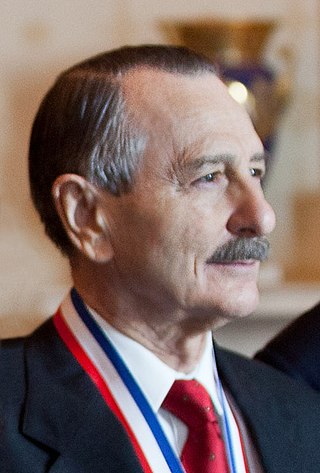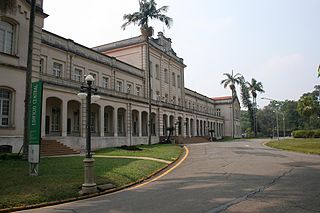
Armand Paul Alivisatos is an American chemist who serves as the 14th president of the University of Chicago. He is a pioneer in nanomaterials development and an authority on the fabrication of nanocrystals and their use in biomedical and renewable energy applications. He was ranked fifth among the world's top 100 chemists for the period 2000–2010 in the list released by Thomson Reuters.

The President's Council of Advisors on Science and Technology (PCAST) is a council, chartered in each administration with a broad mandate to advise the president of the United States on science and technology. The current PCAST was established by Executive Order 13226 on September 30, 2001, by George W. Bush, was re-chartered by Barack Obama's April 21, 2010, Executive Order 13539, by Donald Trump's October 22, 2019, Executive Order 13895, and by Joe Biden's February 1, 2021, Executive Order 14007.

Ismail Serageldin, Founding Director of the Bibliotheca Alexandrina (BA), the new Library of Alexandria, inaugurated in 2002, is currently, Emeritus Librarian, and member of the Board of Trustees of the Library of Alexandria. He serves as Chair or Member of a number of advisory committees for academic, research, scientific and international institutions and civil society efforts, and serves on the Advisory Committee of the World Social Science Report for 2013 and 2016, as well as the UNESCO-supported World Water Scenarios (2013) and the executive council of the Encyclopedia of Life (2010) and Chairs the Executive Council of the World Digital Library (2010). He also co-chaired the African Union's high level panel for Biotechnology (2006) and again for Science, Technology and Innovation (STI) in 2012–2013, and was a member of the ICANN Panel for the review of the internet future (2013).
Jeffrey Lynn Bennetzen is an American geneticist on the faculty of the University of Georgia (UGA). Bennetzen is known for his work describing codon usage bias in yeast, being the first to clone and sequence an active transposon in maize, and developing and proposing along with Michael Freeling the model of the grasses as a single genetic system. He is one of two authors, with Sarah Hake of the book "Handbook of Maize." Bennetzen was elected to the National Academy of Sciences in 2004.

Nina Vsevolod Fedoroff is an American molecular biologist known for her research in life sciences and biotechnology, especially transposable elements or jumping genes. and plant stress response. In 2007, President George W. Bush awarded her the National Medal of Science, she is also a member of the United States National Academy of Sciences, the American Academy of Arts and Sciences, the European Academy of Sciences, and the American Academy of Microbiology.

Ralph Lawrence Brinster is an American geneticist, National Medal of Science laureate, and Richard King Mellon Professor of Reproductive Physiology at the School of Veterinary Medicine, University of Pennsylvania.

Jay Tischfield is MacMillan Distinguished Professor and the Founding Chair of the Department of Genetics at Rutgers University. He is also Professor of Pediatrics and Psychiatry at Rutgers. He is currently Director of the Human Genetics Institute of New Jersey.

The Luiz de Queiroz College of Agriculture is a unit of the University of São Paulo involved with research, teaching and extension of services in agriculture, animal husbandry, agricultural and related sciences. The ESALQ main campus, located at Piracicaba, in the São Paulo State, has seven undergraduate and eighteen graduate programs. In addition, ESALQ keeps exchange agreements with many other institutions of the world, and welcome exchange students of several nationalities.
Richard K. Wilson is a leading American molecular geneticist. He is the founding Executive Director of the Institute for Genomic Medicine at Nationwide Children’s Hospital and Professor of Pediatrics at the Ohio State University College of Medicine. He received his A.B. degree (Microbiology) from Miami University in Ohio in 1981, his Ph.D. (Chemistry) from the University of Oklahoma in 1986, and was a Research Fellow in the Division of Biology at the California Institute of Technology (1986-1990). In 1990, Dr. Wilson joined the faculty of Washington University School of Medicine where he co-founded the Genome Sequencing Center/McDonnell Genome Institute. At Washington University, Dr. Wilson was the Alan A. and Edith L. Wolff Distinguished Professor of Medicine, Professor of Genetics, Professor of Molecular Microbiology, and a member of the Senior Leadership Committee of the Siteman Cancer Center.
Jeffrey A. Bluestone is the A.W. and Mary Margaret Clausen Distinguished Professor of Metabolism and Endocrinology at the University of California, San Francisco, and was, for a number of years, an earlier executive vice chancellor and provost of that university. He began the UCSF affiliation in 2000, after earlier extended positions at the NCI-NIH, and at The University of Chicago. Bluestone earned his undergraduate and masters degrees in microbiology from Rutgers State University, and his doctoral degree in immunology from Cornell Graduate School of Medical Science. His current research is focused on understanding T cell activation and immune tolerance in autoimmunity and organ transplantation. As of April 2016, he was also serving as the president and CEO of the Parker Institute for Cancer Immunotherapy, but since left to become the Chief Executive Officer and President of Sonoma Biotherapeutics in 2019.
Chandan K. Sen is an Indian-American scientist who is known for contributions to the fields of regenerative medicine and wound care. He is currently a Indiana University Distinguished Professor. At Indiana University, Sen is the director of the Indiana Center for Regenerative Medicine and Engineering (ICRME), J. Stanley Battersby Chair and Professor of Surgery and as the Associate Dean of Research. He is an Editor-in-Chief of the Antioxidants & Redox Signaling as well as the Advances in Wound Care. Sen is known for his co-invention of the tissue nanotransfection technology for in vivo tissue reprogramming. His work has included the study of the electroceutical management of infection, and tocotrienol form on natural vitamin E. Sen has an H-index of 108.






